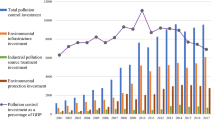Abstract
In this paper, we extend the standard model of private provision of public goods by including consumption externalities to characterize a situation in which economic activities pollute the environment. We consider a case in which there are an industrial country which can afford to invest in the environment and a developing country which cannot. Then, we show that international income transfers in both directions can improve the global environmental quality as well as the welfare of each country. We also show that the results have important implications for policies such as official development assistance or the assignment of tradable emission permits.
Similar content being viewed by others
References
Bergstrom, T. C., Blume, L., and Varian, H. R. (1986): “On the Private Provision of Public Goods.”Journal of Public Economics 29: 25–49.
Buchholz, W., and Konrad, K. (1994): “Global Environmental Problems and the Strategic Choice of Technology.”Journal of Economics/Zeitschrift für Nationalökonomie 60: 299–321.
— (1995): “Strategic Transfers and Private Provision of Public Goods.”Journal of Public Economics 57: 489–505.
Chichilnisky, G., and Heal, G. (1994): “Who Should Abate Carbon Emissions?: an International Viewpoint.”Economics Letters 44: 443–449.
Ihori, T. (1996): “International Public Goods and Contribution Productivity Differentials.”Journal of Public Economics 61: 139–154.
Murdoch, J. C., and Sandler, T. (1997): “The Voluntary Provision of a Pure Public Good: the Case of Reduced CFC Emissions and the Montreal Protocol.”Journal of Public Economics 63: 331–349.
Niho, Y. (1996a): “Effects of an International Income Transfer on the Global Environmental Quality.”Japan and the World Economy 8: 401–410.
— (1996b): “International Income Transfers and the Environmental Quality.”Keio Economic Studies 33: 23–33.
Ono, T., and Maeda, Y. (1997): “Long-run Neutrality of the Effects of International Transfers on the Environment.” Mimeo, Osaka Prefecture University, Osaka.
Stranlund, J. K. (1996): “On the Strategic Potential of Technological Aid in International Environmental Relations.”Journal of Economics/Zeitschrift für Nationalökonomie 64: 1–22.
Warr, P. G. (1983): “The Private Provision of a Public Good Is Independent of the Distribution of Income.”Economics Letters 13: 207–211.
Author information
Authors and Affiliations
Rights and permissions
About this article
Cite this article
Ono, T. Consumption externalities and the effects of international income transfers on the global environment. Zeitschr. f. Nationalökonomie 68, 255–269 (1998). https://doi.org/10.1007/BF01237195
Received:
Revised:
Issue Date:
DOI: https://doi.org/10.1007/BF01237195




